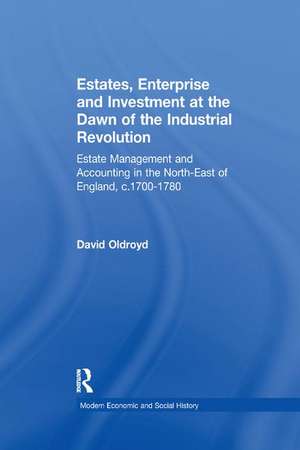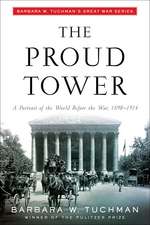Estates, Enterprise and Investment at the Dawn of the Industrial Revolution: Estate Management and Accounting in the North-East of England, c.1700-1780: Modern Economic and Social History
Autor David Oldroyden Limba Engleză Paperback – 27 feb 2017
| Toate formatele și edițiile | Preț | Express |
|---|---|---|
| Paperback (1) | 489.26 lei 43-57 zile | |
| Taylor & Francis – 27 feb 2017 | 489.26 lei 43-57 zile | |
| Hardback (1) | 1054.71 lei 43-57 zile | |
| Taylor & Francis – 28 oct 2007 | 1054.71 lei 43-57 zile |
Din seria Modern Economic and Social History
-
 Preț: 401.92 lei
Preț: 401.92 lei -
 Preț: 356.70 lei
Preț: 356.70 lei -
 Preț: 469.34 lei
Preț: 469.34 lei -
 Preț: 389.38 lei
Preț: 389.38 lei -
 Preț: 469.34 lei
Preț: 469.34 lei - 17%
 Preț: 342.59 lei
Preț: 342.59 lei -
 Preț: 469.34 lei
Preț: 469.34 lei -
 Preț: 489.26 lei
Preț: 489.26 lei -
 Preț: 469.34 lei
Preț: 469.34 lei -
 Preț: 469.34 lei
Preț: 469.34 lei - 15%
 Preț: 304.46 lei
Preț: 304.46 lei - 16%
 Preț: 301.72 lei
Preț: 301.72 lei -
 Preț: 469.34 lei
Preț: 469.34 lei - 16%
 Preț: 338.33 lei
Preț: 338.33 lei -
 Preț: 469.34 lei
Preț: 469.34 lei -
 Preț: 469.34 lei
Preț: 469.34 lei - 12%
 Preț: 299.52 lei
Preț: 299.52 lei - 17%
 Preț: 302.38 lei
Preț: 302.38 lei - 18%
 Preț: 299.52 lei
Preț: 299.52 lei
Preț: 489.26 lei
Nou
Puncte Express: 734
Preț estimativ în valută:
93.65€ • 101.76$ • 78.72£
93.65€ • 101.76$ • 78.72£
Carte tipărită la comandă
Livrare economică 21 aprilie-05 mai
Preluare comenzi: 021 569.72.76
Specificații
ISBN-13: 9781138264298
ISBN-10: 1138264296
Pagini: 234
Dimensiuni: 156 x 234 mm
Greutate: 0.45 kg
Ediția:1
Editura: Taylor & Francis
Colecția Routledge
Seria Modern Economic and Social History
Locul publicării:Oxford, United Kingdom
ISBN-10: 1138264296
Pagini: 234
Dimensiuni: 156 x 234 mm
Greutate: 0.45 kg
Ediția:1
Editura: Taylor & Francis
Colecția Routledge
Seria Modern Economic and Social History
Locul publicării:Oxford, United Kingdom
Cuprins
Contents: General editor's preface; Introduction; Estate organization and reporting needs; Contractual arrangements; Return on investment; Labour process/labour control; Behavioural aspects; Conclusion; Glossary; Bibliography; Index.
Notă biografică
David Oldroyd is Reader in Accounting and Finance at the University of Newcastle, UK.
Recenzii
'Historians and social scientists of all hues should read this book as it shatters the beliefs cherished by many about the immaturity of business and accounting until the late-19th or even 20th centuries. It deserves to become a notable milestone in the history of accounting and capitalism, both for its erudition and its findings, but, perhaps more importantly, for the effect it should have in stimulating the further debate and research that we need to understand and learn from our industrial past.' Rob Bryer, University of Warwick, UK 'David Oldroyd's aim is to "enhance our understanding of the development of modern industrial society by observing it at the margin". The borderline time-scale is 1700-80; the site studied is the first part of Britain to industrialise on a significant scale - the north-east of England. His monograph explores the role of accounting in the transition from a mercantile to an industrial society, with interaction between the full range of business participants a key feature of his story. A powerful characteristic of Oldroyd's work is the skilful use of high-quality archival sources, with his discoveries interpreted through a critical lens that draws upon Marxist and Foucauldian theories relating to labour process and labour control. This scholarly text, written in a lively and engaging style, will prove a key reference work for those wishing to understand the role of estate management and accounting in the emergence of an industrialised Britain.' John Richard Edwards, Cardiff Business School, UK ’It is to the author's credit as well that he has produced a valuable and interesting book.’ EH-Net ’Oldroyd offers a fascinating insight into the accounting and management practices of three estates in the north-east of England. ...Consequently, Estates, Enterprise and Investment provides a valuable contribution to the debate about the progress of capitalism during the eighteenth century.’ Agricultural History Review ’The insights
Descriere
It is generally accepted that Britain's formative industrial development took place on landed estates where the labour, minerals and space was available to support fledgling industry. Yet despite this consensus, surprisingly little attention has been played to the management and accountancy practices of these estates. It is the purpose of this book to fill this gap, examining the issues through the lens of estate accounts and supporting documentation.














